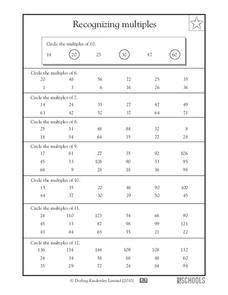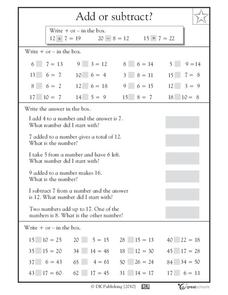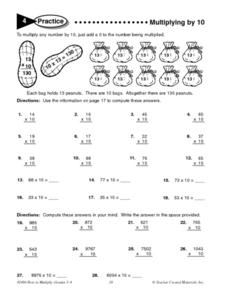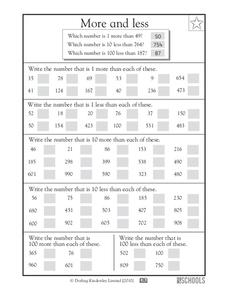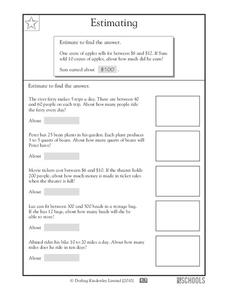Curated OER
Speed Trials
Get those pencils moving with these timed multiplication drills! With numbers from 0 to 10, these sixty math problems are sure to challenge your learners' multiplication tables and mental math. Use this activity as a timed quiz in class,...
DK Publishing
Real-Life Word Problems
Prepare your second graders for word problems with a straightforward review worksheet. Use it after a unit on addition and subtraction up to 100, or after you have worked on money math. A sample word problem prompts young learners to...
Curated OER
Recognizing Multiples
Can your fourth graders recognize multiples of 10? What about 11 and 12? Use this worksheet to enhance your multiplication lesson, or to assess what your math students already know about finding multiples. Given six sets of numbers, they...
Curated OER
Add or Subtract (up to 50)
Do you add or subtract? It's up to your mathematicians as they fill in the symbol for 16 equations to make them true. The numbers in this section don't exceed 18. Next, learners answer six word problems by determining the missing addend...
Curated OER
Recognizing Multiples
By asking learners to identify multiples of 6, 7, and 8, you will be able to assess their grasp of these multiplication facts. For each of these numbers learners examine five set of digits and circle the multiples from the sets. A final...
Curated OER
Choose the Operation: Plus or minus (up to 100)
Investigate the relationship between addition and subtraction as scholars fill in these number sentences, each of which is missing a symbol. Is it a subtraction or addition equation? There are 20 of these to start, all written...
Curated OER
Using the 10 Times Table
Dividing by 10 and multiplying by 10 is an integral skill for young scholars as they learn base-10 multiplication and division. First, they match five products to their equivalent equations, all of which include 10 as a factor. Next,...
Curated OER
Playing a Math Game Can Enhance the Learning Experience
This fun and educational game will help your students develop their mathematics skills.
Curated OER
Greatest Common Factor
These multiples share a few factors, but which one is the greatest? Scholars list the factors for various number pairs, first just indicating common factors. Next, they do the same but write down the greatest common factor. Finally,...
Curated OER
Practice the 7s
Get those mental mathletes thinking on their toes! Can they recall multiples of seven in these timed exercises? Scholars who have already learned multiples of seven get some timed practice as they finish this 60-problem set. They...
Curated OER
Some of the 6s
Quick! Can your mathematicians recall multiples of six in these timed exercises? There are 26 equations here, split into five distinct sections. Learners fill in products and factors, dealing with number sentences in both numeral and...
Curated OER
Multiples
Explore multiples of three and four with 18 sets of numbers. Learners examine each row and circle the multiples of three (for the first nine) and four (for the last nine). There is an example as reference, however none of these are...
Curated OER
Practice the 9s
How fast can you finish? Scholars who have already learned multiples of nine get some timed practice as they finish this 60-problem set. They multiply nine by numbers 0-10 with a goal of both speed and accuracy. Two minutes would be an...
Curated OER
Multiplying by 100
In this math worksheet, students learn the tricks to multiply any number by 10, 100 or 1000. There are 75 problems on 3 pages, both written horizontally and vertically with instructions and picture illustrations to help students.
Curated OER
More and Less
Mental mathematicians add and subtract 1, 10, and 100 from sets of numbers. Each set of one, two and three-digit numbers gives scholars a chance to practice their addition and subtraction skills. There are 62 whole numbers in all. What...
Curated OER
Easy Mental Multiplication
In this math worksheet, students learn to multiply larger numbers by one or two digits mentally. Students read the simple techniques and then solve 25 multiplication problems using these mental math skills.
Curated OER
Factors of Numbers from 31 to 65
Finding factors is an integral aspect of multiplication. Although there are two examples here, they don't illustrate the process so you will still need to model this a few times for scholars. First, mathematicians list the factors for...
DK Publishing
Finding Multiples 2, 5, and 10
Solidify multiplication facts by identifying multiples of two, five, and 10. There are six sets of numbers here, and for each set learners circle those that are multiples of one of these numbers (two sets for each). Use the example to...
Curated OER
Addition Practice #1
Show young mathematicians that they are fully capable of mentally adding two-digit numbers. They start by solving 12 two-addend problems (all with two-digit numbers and aligned horizontally). There is no room to show work. Consider...
Curated OER
Factors
Factoring numbers helps prepare scholars for fractions and algebra, so build confidence by drilling this skill and promoting reflection in the process. Scholars start by listing factors for 18 numbers, none of which exceed 30. Next, they...
DK Publishing
Estimating
Through estimating, scholars are able to make these word problems simpler as they multiply to find approximate answers. Using an example as guidance, they solve five scenarios, each of which has space for learners to show their work. The...
Curated OER
Factors of Numbers from 1 to 30
Finding factors is an integral skill on the road to fractions and algebra. Scholars write down a factor list for nine numbers up to 30. Next, they examine provided lists and circle the numbers that are factors of eight more numbers, also...
Curated OER
Counting Up and Down
These number sequences are missing quite a few digits; can your scholars determine some of them? Because learners aren't filling in every blank, they must utilize mental math to determine only the few numbers indicated. They count...
Curated OER
Counting by 2s, part 2
Two, four, six, eight...can your scholars count by twos? They fill in missing numbers in 18 number sequences, all of which require skip counting by twos. Some begin on an even number and others odd, however all of these are whole...




